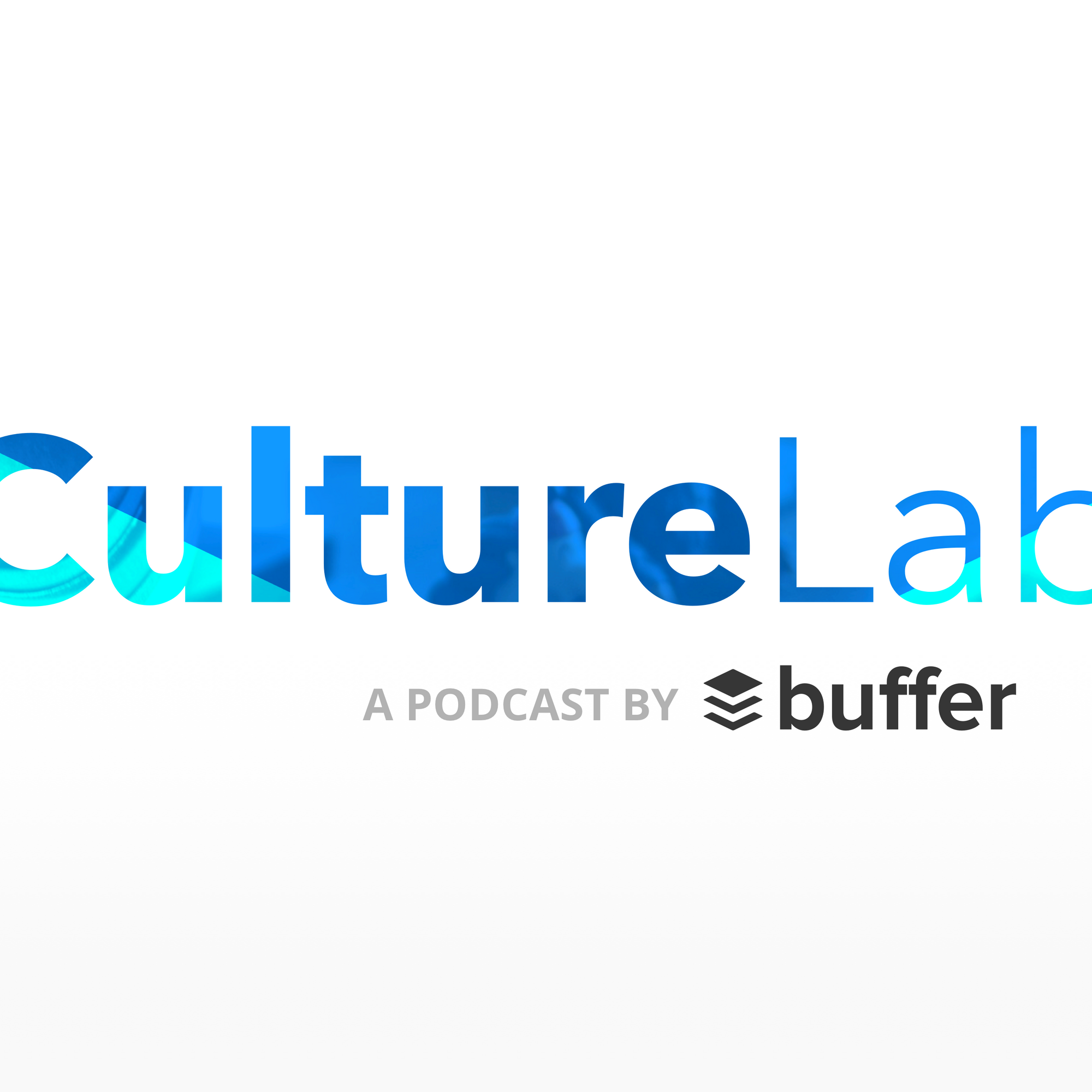
Buffer CultureLab Episode 4: Hello, I Know Your Salary (with Maurice Cherry)

Former Director of People @ Buffer
(Editor’s Note: Hi there! We’re experimenting with sharing the transcripts of our new podcast, Buffer CultureLab, on the Open blog. Would love to hear how this feels for you!)
This is Buffer CultureLab, a podcast by Buffer – where we’re slightly obsessed with creating happier more human work. Here are your hosts, Courtney Seiter and Carolyn Kopprasch.
Carolyn Kopprasch: Welcome to the show, this is episode 4.
Courtney Seiter: Woohoo!
Courtney: On this episode Carolyn and I are going to talk a little bit about transparency at work and how we implement that at Buffer and a little bit about some other places too. And I was really lucky to interview Maurice Cherry. He’s the editor and chief of a podcast and community called Revision Path, and he has so much great advice and insight.
Carolyn: Cool. Let’s dive in.
What it means to default to transparency
Courtney: Buffer has a value of transparency that gets more attention, I would say, than any of our other values. Would you say that’s the case, Carolyn? And I think you have some context about how that value came about for us.
Carolyn: Yes. I would be happy to share that. The transparency value is such a fun one and the wording of it is interesting as well. We tend to shorten our values when we talk about them to single words. Positivity, transparency.
Courtney: Yeah.
Carolyn: This one in particular is relevant because it’s default to transparency. Which is slightly different. Transparency is: Yeah, when possible and as much as possible, share. And default to transparency is: Unless you have a really compelling reason not to share, then make it transparent. Which is a little bit of a nuance but we do hold things up to the light of that value and say unless we decide otherwise we want to default a transparency here.
My understanding, and I’m probably oversimplifying it, is since Joel and Leo first started they were somewhat young. Joel had founded another startup in the past. It was still relatively new to him, as all humans are, to anything. He felt like he had a lot to learn and was excited to learn from others who had come before him. My understanding is that their experience was that while they got incredible advice from people, and read a ton of really valuable blog posts about how to make certain decisions, oftentimes when they were looking for examples there were a lot of hypotheticals and descriptions on how to think through a question or problem.
There weren’t a ton of examples of “this is what we decided on.” There weren’t a ton of companies that answered the question, not just how do you think through choosing a salary for a new teammate, but “this is what we chose for this teammate.” Salary is not the obvious example, but there’s all kinds of things like that. What is an acceptable churn rate, how do you measure MRR?
That emotional piece of salaries is an intense example. Something a little more strictly mathematical, even though those were not as talked about. They kind of decided “OK, we’ll do that, we’ll be that example. For all companies that come after us, we’ll be one data point.”
They started to share that and what they found was that it blossomed into this incredible connection tool, especially for the team we felt like we have all the information to make decisions.
There was a lot less having to translate and share, because everything’s internal and transparent. Once we started to do it a little more widely customers, potential customers, investors, even friends of Buffer started to feel really excited about it and it became a cultural central tenant for us.
Courtney: Absolutely. I think it’s one of the things that people really seem to know about us, if maybe they don’t know much about what Buffer does as a tool or maybe much about Buffer’s culture.
One thing they might know, possibly, is we’re the radical transparency people. That’s our jam. So that’s a fun conversation to be a part of. Just because it’s so different. And I come from a marketing background, so anytime you can find that angle that makes people sit up and notice, it feels like such an amazingly powerful tool we have through transparency. We didn’t set out to get press on this and become known for this, but it just kind of happened in a really cool organic way.
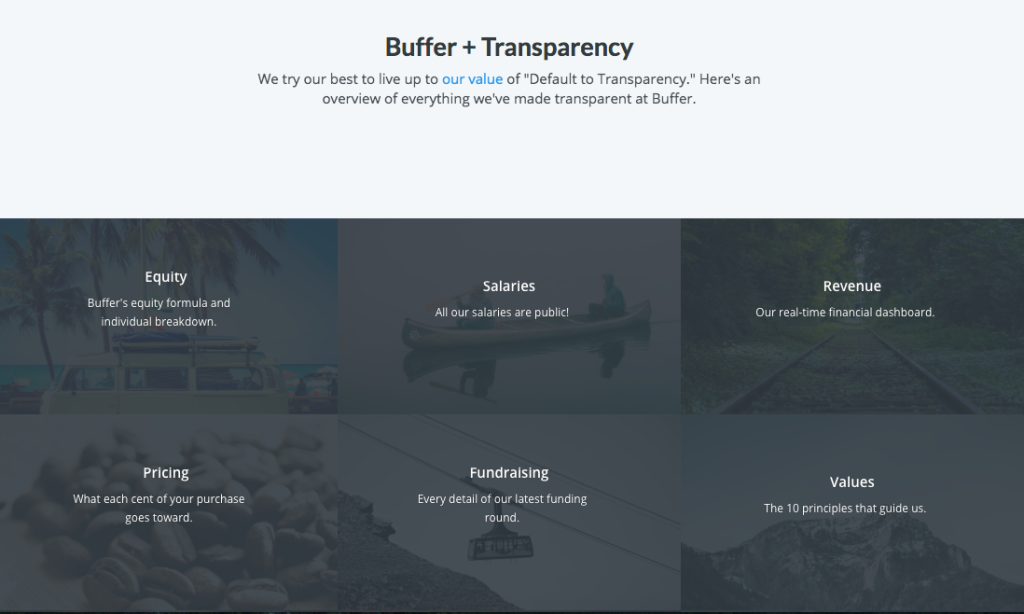
Carolyn: I can’t tell you how many times people have shared one of those blog posts or any of the things at buffer.com/transparency, and said “we are working on this. This is something we’re talking about. We’re inspired by this, we made these changes as a result of seeing this as the example.”
Courtney: Wow.
Carolyn: Yeah. This comes up in all sorts of cultural conversations but it’s hard to imagine what you can’t see as an example and I think this is one of those cases. Several companies, there are many who do transparent salaries internally. Whole foods being a great example of that.
Courtney: Yeah.
Carolyn: Big companies that have a lot of employees in a lot of different types of roles and different states. To share completely transparently with the world I think is relatively new and I do think the more as millennials and whatever the one that comes after millennials. What are they called?
Courtney: That’s a good question, I don’t know. We’ll find out.
Carolyn: Okay we’ll put that in the show notes. (Note: Generation Z!) I think this is becoming something that is celebrated at a really fundamental level.
Courtney: So you were around, and correct me if I’m wrong about this, when Buffer made the decision to share salaries openly with the world. What every teammate gets paid is on a public spreadsheet for the world to see. I imagine during that time there was probably some interesting internal discussion.
Carolyn: I was around before salaries were internally transparent as well. That came first. I think I want to mention that because I do think that that’s a really important stepping stone on that journey. A lot of the benefits that come out of transparency around salaries and really anything. Salaries is the most obvious and public discussed example. If you want to get some of these benefits having it be transparent internally sometimes gets you 80% of the way there.
Courtney: Yeah, you don’t have to tell the whole world.
Carolyn: Exactly. Yeah, a lot of the wonderful things that came out of that was the result of having the whole team have that information and be able to talk about that openly. When they decided to make it transparent internally that was when they introduced the concept of the formula.
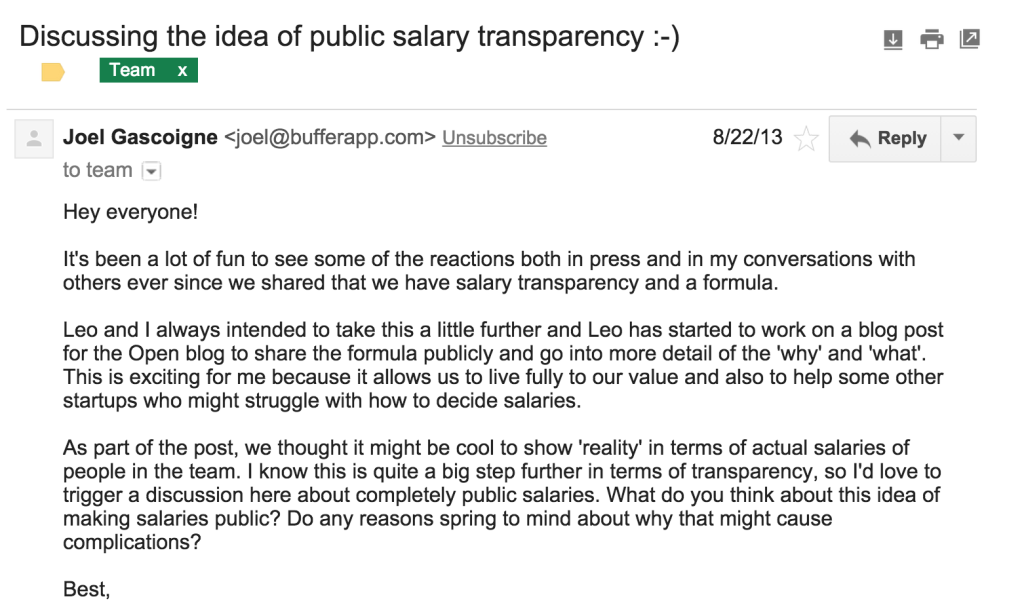
Courtney: Yeah.
Carolyn: That also helped because they didn’t just hit publish and they didn’t just make a list and publish it. They first said “okay if we’re really comfortable with this and make changes accordingly and then publish that.” One very important factor of that is at that time when they designed the formula, they made sure that every salary was either going up or staying the same.
Courtney: Ah, okay.
Carolyn: Everybody was happy.
Courtney: Yeah, of course. Wait, how were you paid before the formula? How was your salary determined at that point?
Carolyn: I was offered the job and given a number and I went, great! Which this is a whole separate conversation but in both this job and my previous job both times when I got the job offer with a number I went, great! And it didn’t occur to me.
Courtney: Same. Same, girl! Same. No negotiation whatsoever.
Carolyn: It did not occur to me to argue or discuss that.
Courtney: Yeah, to offer a new counter number.
Carolyn: No, and part of the reason was because the offer from Buffer was so generous.
Courtney: Sure, yeah. We have a great tendency to pay above market, which is so nice.
Carolyn: Yes. That’s one very relevant factor, but also a whole bunch of other cultural contributions and you and I should talk about it another podcast.
Courtney: That’s the podcast with wine.
Carolyn: I was just offered the job, given a number, and then they made the formula and made it public internally.
That happened first, and that had very little resistance partially because we were a smaller team. We were more able to have conversations openly and get to the bottom of things. We were 8 or 9 people, I think. There was also so much less resistance. At that moment we had already agreed upon the values. When that first step happened, if my memory serves me, we had already said defaulting to transparency is a value that would hold. That was an obvious next thing, and we were all excited about that because of all the benefits that come out of that.
It makes it a non-issue, you are able to talk about it if you need to much more comfortably. You don’t have to guess, it’s just this wonderful thing. It has the opportunity of internally crowdsourcing these numbers. Does this feel, if it feels off let’s talk about it. You get 8 pairs of eyes on that number instead of 1 or 2. That happened first and then a little while later the team had grown. We had embraced this value of transparency even more. That’s when Joel sort of said “Okay, let’s start the conversation about what it would look like if we decided to think about publishing this more transparently.”
Courtney: All the qualifiers!
Carolyn: Yeah, there were so many, and I have to say to his credit, I think he really hoped this would be the outcome. He was certainly encouraging us and excited to talk about the potential benefits, but he was really quite patient and open minded about whether that would be the outcome or not.
Courtney: Yeah, left it open to say whoa, this doesn’t feel good to me.
Carolyn: Very much, and we did. It took months of conversations about what this would mean and how it would look and what is transparency mean in this case? Does it mean that it’s public and it’s available if somebody wants to click through 15 different links and find it? Or does it mean we published buffer.com/transparency and it’s a pop-up on our open blog. Obviously we chose the latter.
Courtney: We went for it.
Carolyn: Yeah and that was one of the factors. Is this something that we’re going to be publicly really sharing and putting out there, or is it something that’s just available in sort of a whole fashion?
Courtney: Hmm, interesting.
Carolyn: We uncovered all kinds of fears about it. Most of which, actually none of which, came to happen at least as far as I remember.
Courtney: What were some of those, would you mind sharing?
Carolyn: I think a lot of the hesitations were just around the unknown. There were some obvious ones that other people have brought up since then. Well, what if we publish our salaries and then somebody from another company wants to poach one of your employees and just pay them more. Okay ,then they should go. If that’s a better situation, do that. There were all sorts of these fears that we kind of went “yeah, if that happens we’re okay with that.” There was just a lot of those specific things that we went, yep we’re okay with the potential …
Courtney: We can deal with that.
Carolyn: Yeah the hesitations were more what if we haven’t thought about, what about these things we haven’t thought of? What if there’s outcomes that. And then you go down the rabbit hole. What if you are, do you potentially open yourself up to theft? It’s these boogeyman type fears. One team member in particular was a little anxious about how that would affect hiring down the road and whether we can be fully inclusive if we made these cultural decisions that isolate an entire group.
Courtney: That’s interesting.
Carolyn: Yeah and we didn’t really solve that, and I don’t know if we ever have. We just decided that this is something that we’ll have to work through and hopefully we can be supportive of those individuals in other ways. Make sure that if anybody comes and says this is a problem for me here’s why and here’s what I would like to do about it, that we would always be completely open to having that conversation no matter what, no matter when.
Courtney: Just flashing forward a tiny bit to when these were made public. Did you have any idea what would happen as a result? From my standpoint and I have not yet joined the team but I saw lots of blog posts, lots of media about it. Lots of deep dives into everyone’s salaries and who made what and why. Did y’all have an idea that that might be the result of this?
Carolyn: In a word, no. This was not one of the main conversation pieces. In fact we hardly talked about it at all. Other than saying will we be really forthcoming about it and put it out there, or will we just make it available if somebody really wants to find it.
Courtney: Yeah.
Carolyn:That was really the extent of it. Yeah I don’t think so.
Courtney: How does it feel to see them?
Carolyn: Those blog posts?
Courtney: Mm-hmm (affirmative)
Carolyn: I was so proud, and I still am so proud. Our first “publishing our salaries” post is still one of our most viewed and shared blog posts on the Open Blog. I felt so proud because from a company perspective we had chosen this value because we believed it was the right thing to do for us, and for the world. Then we had had upheld it in the most scary way so far.
Courtney: Definitely.
Carolyn: This was definitely the most emotional and scary one that we had done, a number that we had made transparent. We had done it regardless of the fear, in spite of the fear. I felt really proud of that for Buffer. I also felt proud for, I’m going to oversimplify this for the sake of time, the new generation of companies.
Courtney: Yeah.
Carolyn: I felt so excited for the equal pay efforts and things like that that were being discussed and unfolding before our eyes that the world was embracing this, and I felt proud of that. I certainly never anticipated to at conferences and having people walk up to me and stick out their hand and say “Hi, nice to meet you. I’m so-and-so, I know your salary. Let’s talk.”
Interview with Maurice Cherry of Revision Path

Courtney: Our guest this episode is Maurice Cherry. He’s a designer, an entrepreneur and the founder and creative principle of his own firm called Lunch in Atlanta. Maurice is also the editor and chief of Revision Path. A podcast that has an incredible wealth in more than 100 interviews for black professionals and design, development and other tech related fields. I’m really excited for y’all to hear from him.
Courtney: Thank you so much for doing this.
Maurice: Thank you for asking me.
Courtney: Oh yeah. I’ve been so excited to keep up with you ever since, I forget when we first got in touch. I think you reached out to me when I first started working on inclusivity efforts, which was so thoughtful of you. It’s been really neat to watch you grow the Revision Path empire ever since.
Maurice: I don’t know if I’ve called it empire just yet. It’s slow going but I think that there’s certainly things I’ve been able to put in place based on some funding that I’ve gotten from sponsors and things like that that have helped me keeps things going at a good baseline level.
Certainly there’s more that I would love to do but I want to say it’s like slow and steady wins the race. I’m not rushing on anything just yet. I think things are at a pretty good spot.
Courtney: Yeah. I’ll just jump right into some of my questions.
Maurice: Okay.
Courtney: You said that you created Revision Path because, I read this in an interview, you wanted a forum for the stories and experiences that are often underrepresented in the digital space. I love that as a mission and I would love to hear you talk a little bit more about that.
Maurice: Yeah, sure. What I think most people in this industry that probably don’t necessarily fall into the, I don’t want to say the default demographic, but generally because diversity is such a hot topic right now. What ends up happening is people from underrepresented spaces end up getting tapped to speak about their experiences being an underrepresented person. For example, they might just want to speak about what it’s like to work as a woman, or what it’s like to work as a black person, or what it’s like to work as a gay person.
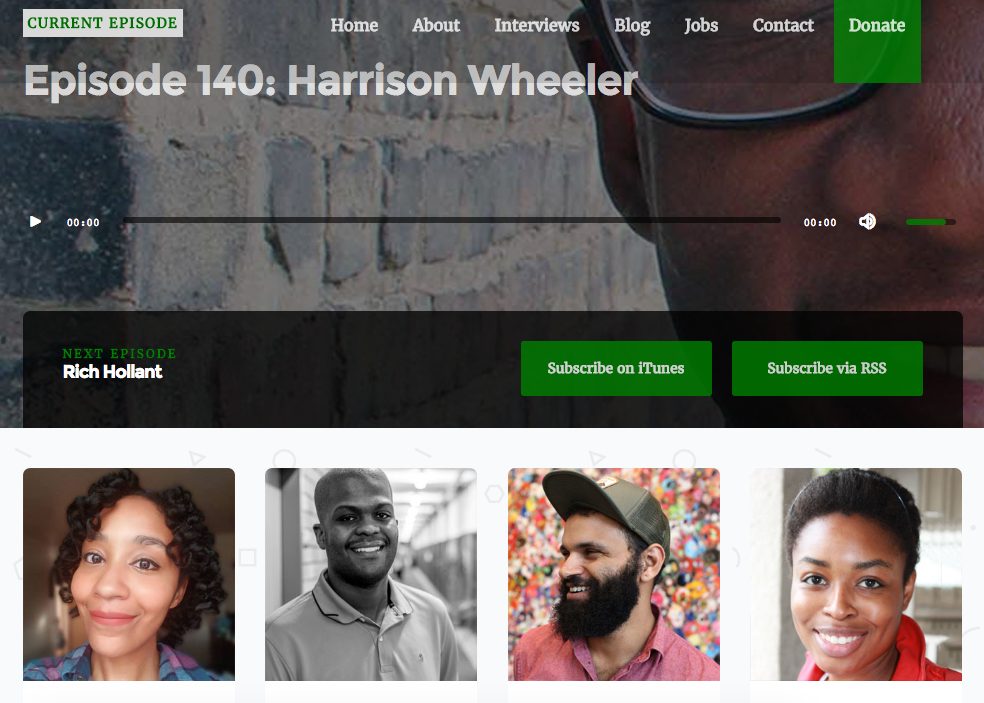
Courtney: Mm-hmm (affirmative)
Maurice: But not taking into account the fact that they are actually skilled workers. For example, there have been panels that I’ve spoken on where I’m a designer by trade. I’ve had a design business for several years, but when they ask me to come on and speak they don’t ask me anything about my design business it’s just about what’s it like being a person of color or what challenges do you face. That sort of thing, I mean not saying that those perspectives are not important but I think what ends up happening is people that fall into that space end up getting diluted into just that being their experience.
Courtney: Yeah.
Maurice: I don’t get to talk about, well what is their thought process when they design? What does inspire them, or what kind of experiences have they had to get them where they are today. I think that Revision Path is a good platform to explore those questions and more. What I like to call a safe space. Generally I’d say maybe 95% of the people I’ve interviewed this is my first time talking with them.
Courtney: Ah.
Maurice: Sometimes it’s the first time anyone has talked to them about their work in this kind of way. I like to think that the combination of those 2 things create this safe space for them to really open up and discuss who they are, what they do, what their experiences and their processes are like.
Courtney: Yeah. What is it like to be asked that same question over and over again, about your experience being an underrepresented person? Do you hear it and think, “Oh no, not again”? or do you think each time is a new opportunity to share a story that folks haven’t heard yet?
Maurice: I think it depends. For anyone that speaks on a regular basis, they’ve got a few boilerplate answers they can always throw out there.
Courtney: Sure.
Maurice: I think just the fact that people are asking is perhaps a good thing. I don’t want to say it’s a situation where any press is good press, but certainly it’s gotten to the point where I can dictate what the answer’s gonna be before they ask the question.
Courtney: You mentioned just a few seconds ago that diversity is a hot topic in tech right now, and I definitely would agree. Why do you think that is?
Maurice: I think it’s becoming a hot topic now because really more people are speaking up about it. Social media is allowing the topic to flourish in a lot of different arenas than it hasn’t before. I think anyone that has worked in this industry for any considerable amount of time knows that any of the experiences that people have shared are not new experiences. These are not experiences that have just cropped up because of the current landscape. A lot of these things have persisted in the industry for dozens of years.
What’s different now is that social media allows us to share these on a pretty democratic forum, if you’re on Facebook or Twitter or something like that. Other people can pick up on that. They can empathize with your story, they can share your story. It’s beginning to get amplified. People are also able to take those same concerns directly to companies. For example, what was the, I think it’s called the open diversity …
Courtney: Oh, Open Diversity Data?
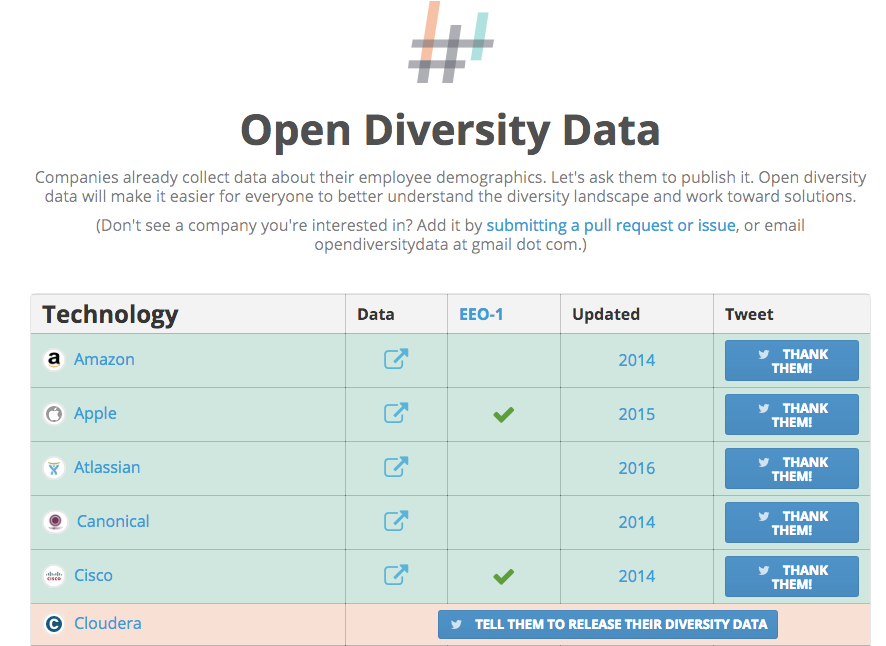
Maurice: Yeah the Open Diversity Data site. When that happened that happened out of an instance where I believe an engineer just asked, I think it was Tracy Chou I believe?
Courtney: Oh, from Pinterest.
Maurice: Yeah just asked flat out what the statistics were at the company she was working at, at Pinterest. From there it sort of grew into to her companies. Them sharing their workplace data. It’s something now that is a perennial l topic. Have we seen the numbers really move? Not that much, but I think that’s to be expected just based on how businesses operate.
Diversity is a hot topic again because social media, the internet has really allowed it to thrive.
Courtney: Yeah.
Maurice: For when a lot of this stuff was being shared, and it still is being shared in this way. It comes off very anecdotal. People will write it off as such. It’s an anecdote. People want to see data. The good thing I think that has come out of a lot of this is that now there are studies and data and reports that show that these things are happening in the industry, so it’s not just some anecdotal thing. It’s actually happening, so people can look at the data behind it and see empirically that this is a problem in the industry.
Courtney: Yeah. It’s really been incredible to see people at specific companies feel empowered enough in their role and their position to say, “It’s not enough that I just work here. I need to know more about the culture of this place. I need to know where you stand as far as creating the environment I want to work in. I want to put that data out to help other people, too.”
Revision Path, would you call that a side project right now? Or is it slightly bigger than a side project at this point? It seems pretty big to me.
Maurice: That’s a good question. I always have treated it as a side project because what I do with Lunch when I’m talking with clients, I do digital strategy, I do web design, graphic design, email marketing, et cetera. I’ve always felt like that was the bread and butter of what I do.
Courtney: Mm-hmm (affirmative)
Maurice: The podcast was this passion project that I started. Currently, as we’re recording, it’s no longer a side project. It’s definitely my main gig now. I still have my clients, which is great, but the podcasts definitely takes up more of my time. It commands more of my time. Certainly it’s also what’s bringing in more attention with the work that I do. It’s grown out of its side project status now to being my main thing.
Courtney: That’s the dream, right? To create the side project that grows into the main gig?
Maurice: Yeah! I was at a networking thing yesterday and I sort of caught myself because I introduced myself as a podcaster. I was like, whoa wait a minute. No, no, no. I’m a business owner, I’m a designer, but no that was the first thing that came off the top of my head.
Courtney: Yeah. So you’ve done upwards of 130-something interviews at this point. You’ve talked with a whole lot of folks, heard a whole lot of stories, I presume. What has surprised you about all these conversations?
Maurice: I think what surprised me is that even based on location or even the type of work that we do, there are still similarities that bind a lot of creative people in terms of how we get inspired or what we need to do when It comes down to analyzing projects and things like that. I’m trying to think what has really surprised me the most.
I would probably say, to say this surprise is a bit of a stretch, I would say there’s been this lack of mentorship overall. The majority of the people I’ve spoken with have forged their own way. They’ve probably picked up some mentors of some sort going from job to job. Certainly no kind of formal mentor-mentee relationship where there is someone that is helping guide them throughout the industry.
I don’t think that’s something quite honestly that is just for black designers and developers. I find that that’s something that is endemic of the whole design industry.
Courtney: Interesting.
Maurice: Maybe it’s not enough people giving back, not enough mentorship. It feels like everyone is running their own race in a way.
Courtney: Mm-hmm, yeah.
Maurice: With Revision Path what I think the good thing is even though a lot of these people that I’ve talked with may not have had mentors or things like that, they’re able to at least see other people that look like them that are doing the same types of things that they. They form this ad hoc peer mentorship in a way. Which I think is very helpful, just to know that there are other folks out there that are doing this. Now with this Slack community that we have we’re able to bring those people together as well.
Courtney: It’s incredible that you started a Slack community. I’m a member, I love hanging out there and listening to the conversations, participating a little bit. It does, you’re right, seem like a very natural offshoot of seeing people in similar roles makes you want to know those people. Now it feels like Revision Path is a true community as well. You’ve got a job board. Can you talk about anything else that might be in the future for Revision Path?
Maurice: Well what is in the future? I’d say in the very near future we’ll be bringing on some writers to create some original content.
Courtney: Nice.
Maurice: One of the things that I’ve really wanted to do since starting Revision Path is have that space where, I guess I don’t want to say what the best way to put it. I’ve wanted to have this space where you can have this thoughtful design content that revolved around race and culture that wasn’t stereotypical. That wasn’t pandering. For example, maybe a retrospective of small black-owned studios and what they do to build business. Maybe a look at professional organizations and what they do for diversity and things like that.
One thing that I see with a lot of design media, I don’t see a lot of attention being paid to culture. When stuff happens, when we talks about diversity it’s usually in somewhat of a negative tone or a negative way. What I want to do is counter that with more positive things, positive stories, case studies, more interviews. You mentioned the podcast interviews. We also got about 3 dozen short and long form interviews on the site as well. I hope to build that out some more too. Not everyone wants to listen to this show or has the time to listen to this, but will read something. We’ve got, I haven’t done a long form interview in a while but I hope to start bringing those back.
Courtney: One thing you do that I really love in the Slack community when you have an interview coming up for the podcast is you’ll tell the Slack community, I’m talking with this person. Do you have any questions for them? Since I’m in the Revision Path slack community I asked if they and any questions for you. Here is one that they had.
“The technology sector has tried to address diversity for the past few years. How do you think tech companies are doing, and what should they do coming forward?” So a really easy question for ya.
Maurice: Yeah.
Courtney: Nothing to that one.
Maurice: No, there’s nothing to that one. Are tech companies doing better? Overall I’m going to say no. I’m going to say no. The reason for that is because change when it comes to this type of thing is really slow. What you’re asking people to do is really disrupt. Not just the status quo of their businesses but the status quo of how they think about the world in some ways. It’s one thing to say yeah, we need to have diversity and inclusion for the business case, but then it’s another thing to follow through based on your personal actions.
I’ve certainly had clients that I’ve worked with in the past that have talked a good game in terms of what they want. Then when it comes to actually doing it, there’s all these little unconscious bias things that pop up that prevents things from actually getting done.
As a whole, do I think it’s getting better? Not really. I think certainly the conversation is increasing. The conversation at this point is increasing to the point where I think it’s it’s own industry.
Courtney: Wow, great point.
Maurice: There’s certainly people out there that run the diversity and tech circuits. Whether it’s making any sort of effective change I don’t know. As a whole, I’m not sure that it’s really changing. The reason I say that is because our industry for the most part is a pretty young industry. A lot of the changes that we’re looking at making are not going to happen from year to year. Probably going to happen more from decade to decade perhaps because you’ve also gotta take into account graduating students that are coming in, people that are phasing out in the industry. You have to also look at ways that the industry itself is changing. This is 2016, if you look back just 5 years ago the industry was completely different from what it is now.
Things are changing in such a rapid pace that companies are not really able to keep up. Adding diversity on top of them having to stay in line with the latest technology, making sure that their product is good and that they’re helping their users. It ends up getting pushed to the back burner. I don’t think it’s getting better. The reasons that it’s not getting better are a myriad of reasons behind that.
Courtney: I have often seen, and I know I have been guilty of doing this, too, at Buffer, when folks will report their numbers, either they have been asked to or they do it voluntarily. They’ll report their numbers and there’s always a little paragraph of shame at the end that says “we know we need to do better and we will, but here are our numbers right now.”
So the second part of that question I think is really important. Can you think of anything that tech companies could do better or more of to start moving in a direction that goes beyond just having those conversations?
Maurice: I think one thing is just build relationships, and I hate to say just build relationships cause it sounds like such an easy and basic thing to do. A lot of companies don’t do that. A lot of companies don’t build that relationship. For example HBCU (historically black colleges and universities). I’d say within the past year or so there’s been this revelation.
Companies say “oh you know a good place that we can look to find qualified black employees? We can look at black colleges.” Of course you can, but what happens is those companies are not making the investment in those colleges in order to make that happen.
I went to a black college, my mom taught a black college, I have deep history with HBCUs in general. Al to of that has to be about, what sort of investment are you putting back into the school? If you’re just going to try to poach students for working there that’s one thing, but what are you putting back into the school?
I’ll give you a prime example, so at Morehouse, Goldman Sachs hires a lot of students from the business department. Goldman Sachs has a relationship with Morehouse that makes that happen in the form of scholarships, in the forms of people coming and just giving talks and things of that nature.
There’s certainly this relationship that company has with the school where it makes it easy for people to go to Morehouse then graduate and work at Goldman Sachs because it’s that pipeline. They’ve established that pipeline. There’s stuff going in, there’s stuff going out.
Courtney: Yeah, you can’t just swoop in once a year.
Maurice: I think what a lot of companies are doing is just doing that swooping in instead of building a pipeline. They’re kind of coming in with a bulldozer or something. Taking out what they can get and not putting anything back into the institutions. It takes work to try to pull from the communities that you want more of in your company you have to build that relationship. It’s like any relationship, it takes work.
Courtney: Yeah and that helps create a communal sense of, we’re all in this together, too. It can easily happen where tech companies feel like they’re fighting for a very small pool of people, which may or may not be the case. I have some doubts about that based on the many wonderful interviews you’ve done. But I think you can say you’re fighting over that small pool or you can cultivate a larger pool. A greater group of people just by being there and putting time into those resources.
Maurice: I don’t see a lot of cultivating happening. I’ll see a company that will go to a job fair and that’s good that’s a start but that cannot be the the only thing that you do.
Courtney: Yeah, I think a lot of people, and maybe you can help with this, a lot of people feel like they want to learn more about communities like Revision Path. They want to get connected with HBCUs, they want to be part of these different communities and don’t know where to start. Do you know know of any good starting places for people who are beginning their journey of getting connected building those relationships?
Maurice: It has to be a quid pro quo type of relationship. Certainly for example through Revision Path, I get a lot of companies that will come to me that will say, we want you to publicize this that we’re doing and tell them that we’re going this. I’ll say, what are you going to say about Revision Path? If you just want to advertise that’s fine, I’ll draft an invoice, but if this is something that’s supposed to be, I want it to be something that’s mutually beneficial.
Yeah, I can shout out about what you’re doing with x,y,z, but also what is your organization going to say about Revision Path? What are you all going to say about the work that we’re going, or the things that we’re trying to do? Generally I’d say 8 times out of 10 that’s the end of the conversation, once I say what are you going to do for Revision Path. They didn’t think that far, they just thought because they were reaching out to an organization like this that we would chomp at the bit for it.
Courtney: Mm-hmm (affirmative)
Maurice: Which, no it’s not going to happen. I think with a lot of groups like this we just have to be discerning. Again, we’re trying to build these platforms that represent these underrepresented audiences. We take that trust very seriously. When I say that I mean groups like #WOCinTechChat, People of Color in Tech, etc.
Courtney: So great; both of those organizations so great.
Maurice: We try to take our communities seriously and not try to pull something over on them. It’s something where you want to work with us, great. What is in it for us as well?
Courtney: Switching gears for a little bit. You’ve done so many interviews on Revision Path and Buffer’s is a brand new podcast. I would love to hear any interviewing tips you might have. What makes a great interview?
Maurice: What makes a great interview? I think what makes a great interview is being really intellectually curious about the person that you’re talking to. Every person that I, people that have been on the show can attest to this. I will tell them I’ve written out no questions. We’re just going to have a conversation.
I have questions in my head that I go to. I’ll ask about mentorship, I’ll ask about what’s a typical day like for them. Everyone that I’ve had on the show they know that I’ve not come up with any questions before hand. I’m riffing off of where the conversation goes. I may have pulled some bullet points from their bio or from their LinkedIn page.
I don’t have a list of questions that I’ve written out. For me that helps me to stay on my toes. Of course I’m listening to the conversation, but I’m also really curious about, okay they might have mentioned something, I say “that’s a good point.” I’ll take notes while I’m doing interviews. Say “that’s a good point. Can we talk about x, y, z? Can we go onto this or go onto that?” Being intellectually curious about who you’re interviewing is good. I would also say don’t be afraid of long pauses.
Courtney: Great one.
Maurice: Don’t feel like you have to talk over your subject, or feel like you’re running over them. Give them enough space after they finish, maybe a second or 2 after, and then go onto your next question.
Every person that I’ve interviewed has been different so it’s hard to say if I have one specific tip. Sometimes I’ll ask, there’s certainly questions that I’ve asked people in the past that I didn’t even think to ask someone in the future. One question I remember asking a few people is “is there anything that you might have done that might have been self sabotage at some point in your career?”
Sometimes asking a controversial question will get you a good answer. You have to gauge where the conversation’s going. I wouldn’t lead off with that. I’d get maybe a good 30 – 40 minutes in, and then drop that.
Courtney: I feel so much more ready for all my future interviews. That’s why I wanted to have you early, I need to know these things before I mess it up. Okay we have time for just a couple of real quick ones. I’m going to try to do a segment in every interview where I just ask some quick hit questions for you.
Maurice: Okay.
Courtney:
Here we go. What time did you wake up today?
Maurice: I woke up at about 11. I had a late morning today.
Courtney: So you have a varied schedule I guess?
Maurice: It varies. Usually, honestly I’m up at the crack of dawn. 6-7-8 am. It varies. It varies.
Courtney: Got it, today was an unusual day. What do you listen to while you’re at work?
Maurice: I listen to podcasts.
Courtney: Of course.
Maurice: I listen to podcasts. I have a regular rotation of music in my Google Play library that I’m listening to. That can be anything from jazz music to current pop music. I listen to a lot of videogame music.
Courtney: Interesting.
Maurice: I hear that it’s the way that video game music is designed is that it helps to give you concentration without being distracted. I’ve often found that it helps especially if it’s a song that I recognize. Before I know it I’m hammering out a task because the video game music is in my head sending me into that mode.
Courtney: I like that. That’s a cool productivity tip. Do you have any tools that you cannot live without?
Maurice: Hmm, I cannot live without. I would have to say my mobile phone, definitely. I cannot live without …
Courtney: Good answer.
Maurice: That’s the conduit to all the devices that I have in my apartment. I’ve got several laptops, and a may computer and everything. My phone is the connecting thing between all of that. In terms of services, Dropbox is something that I use. I also use Buffer, of course.
Courtney: Woohoo! You didn’t have to say that. That’s awesome.
Maurice: I use Buffer, I also use Hootsuite. I use both of them to schedule things out on different platforms. I use Twitter a lot, of course. Whenever I get direct messages or things like that so I can respond to them right away. I also use a service called Enpass, it’s like a password manager. I use that because it’s a tool that I can have on my desktop and on my phone, and on my tablet, and on my laptop. It has all my passwords synced everywhere. You can also create passwords and things like that.
I find that to be indispensable, especially when I’m traveling and I need to log into the WiFi at the hotel and I have to remember what the password is for this. It’s easy to pull all that stuff up without trying to remember everything.
Courtney: Smart, I love that. These are great tools and tips. I am so appreciative for taking the time. I’m such a fan of Revision Path, I’m such a fan of the community you’re building and the work you’re doing. This is a big honor for me, thank you so much.
Maurice: Thank you again, Courtney, for having me on. Good luck with the podcast, I’m really excited to hear who else you have on in the future.
Thanks for listening!
Courtney: Thanks so much for listening to Episode 4. We are so excited to have you with us. We’re learning a lot with every episode. If you would do us the hugest favor and help us out by giving us a review or rating on iTunes, that would be a ginormous help for us.
Carolyn: Yeah, and we would love to hear from you individually as well. We are on twitter @carokopp and @courtneyseiter. Any questions, feedback, ideas, anything. We’d love to hear from you.
Courtney: We would. Thanks so much for listening.
Try Buffer for free
180,000+ creators, small businesses, and marketers use Buffer to grow their audiences every month.
Related Articles

Check out the best podcasts for creators, marketers, small business owners and anyone looking to up their social media.

In this article, we dive into podcaster and Bufferoo Phill Agnew's strategies that can help you grow an engaged audience, no matter the format.
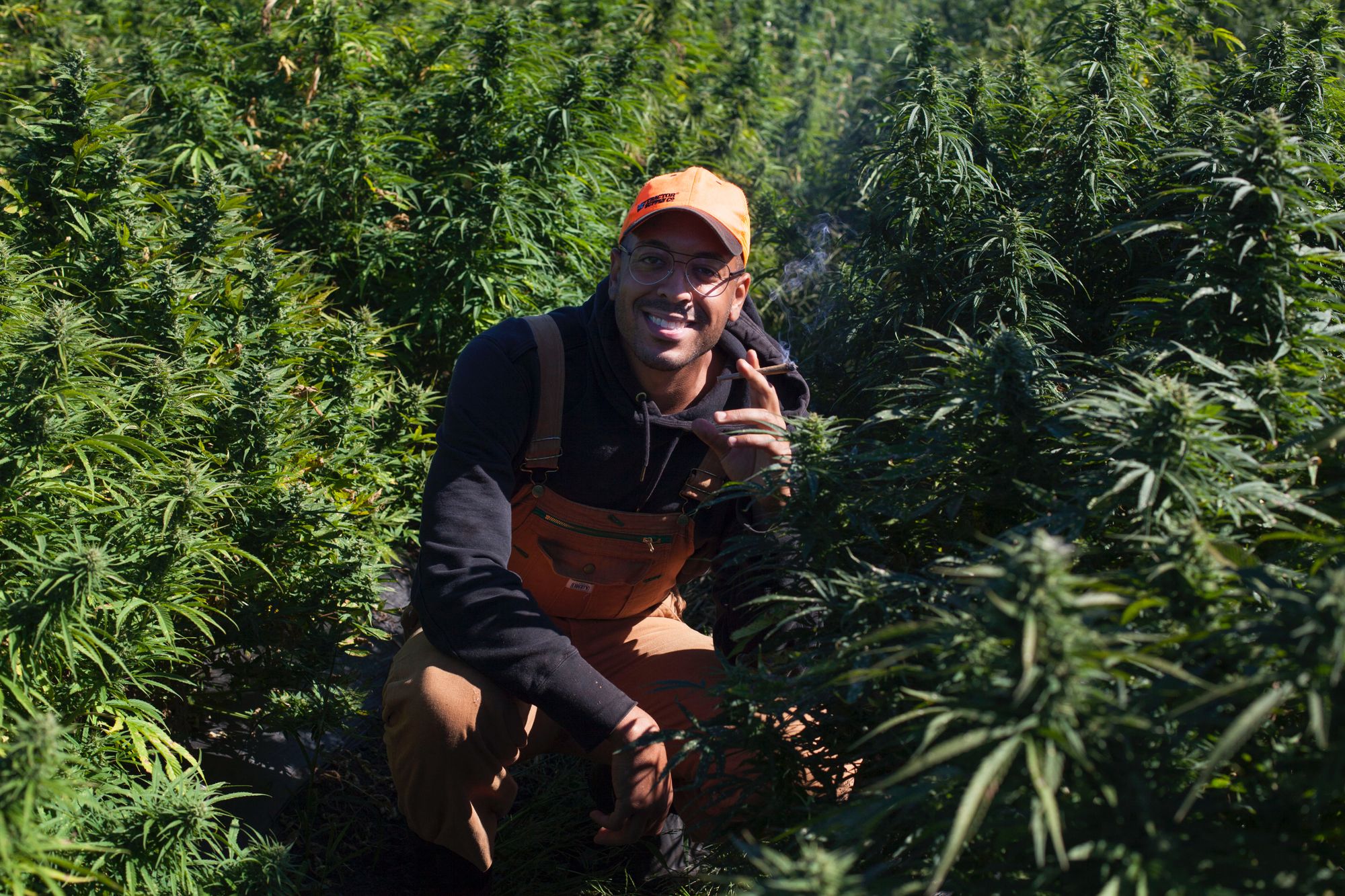
Damian shares his journey from hemp farmer, to teacher, to business accelerator leader, and the economics behind why he focuses so hard on encouraging people to become hemp farmers.